What Are Natural Remedies for Insomnia?
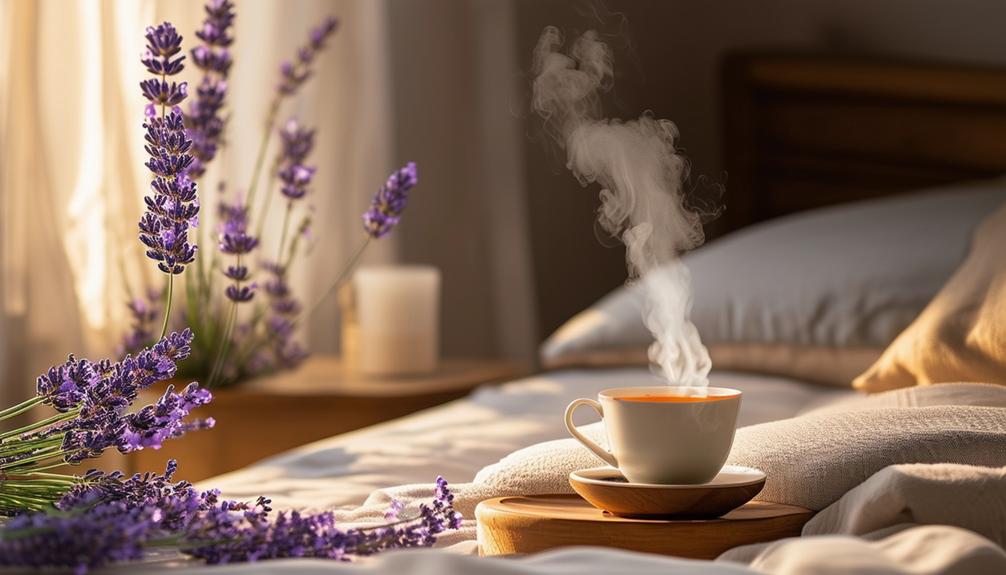
Natural remedies for insomnia can help you achieve better sleep and enhance your well-being. Establish a consistent sleep routine to regulate your internal clock. Optimize your sleep environment by keeping your room cool, dark, and quiet. Practice mindfulness and relaxation techniques like meditation and deep breathing. Regular exercise, such as walking or yoga, can improve sleep quality. Consider herbal supplements like valerian root or chamomile but consult a healthcare provider first. Lavender aromatherapy is also beneficial. Limit intake of stimulants and heavy meals before bed. Acupuncture and cognitive behavioral therapy can provide additional support. For a deeper understanding, continue exploring these methods.
Noteworthy Details
- Establish a consistent sleep routine with regular bedtime and wake-up times.
- Practice mindfulness and relaxation techniques like meditation and deep breathing.
- Consider herbal supplements such as valerian root, chamomile, and lavender oil.
- Utilize aromatherapy with lavender essential oil to promote relaxation and improve sleep.
- Explore acupuncture to reduce stress and improve sleep quality.
Establish a Sleep Routine
Establishing a sleep routine is vital because it helps regulate your body’s internal clock, promoting more consistent and restful sleep. When you set a consistent bedtime and wake-up time, you’re giving your body a clear signal of when it’s time to wind down and when it’s time to wake up. This consistency helps your internal clock stay in sync, reducing the likelihood of insomnia.
Creating a bedtime routine can further enhance this process. Engage in relaxing activities like reading a book or taking a warm bath. These activities signal to your body that it’s time to relax and prepare for sleep. Avoid stimulating activities such as watching TV or using electronic devices close to bedtime. The blue light from screens can interfere with your body’s ability to wind down.
Incorporating relaxation techniques like deep breathing or meditation before bed can also be beneficial. These practices help calm your mind and body, making it easier to fall asleep faster.
A quiet sleep environment is essential as well. Make sure your bedroom is a sanctuary for rest—dark, quiet, and comfortable. By following these steps, you create a holistic and patient-centered approach to improving your sleep.
Optimize Sleep Environment
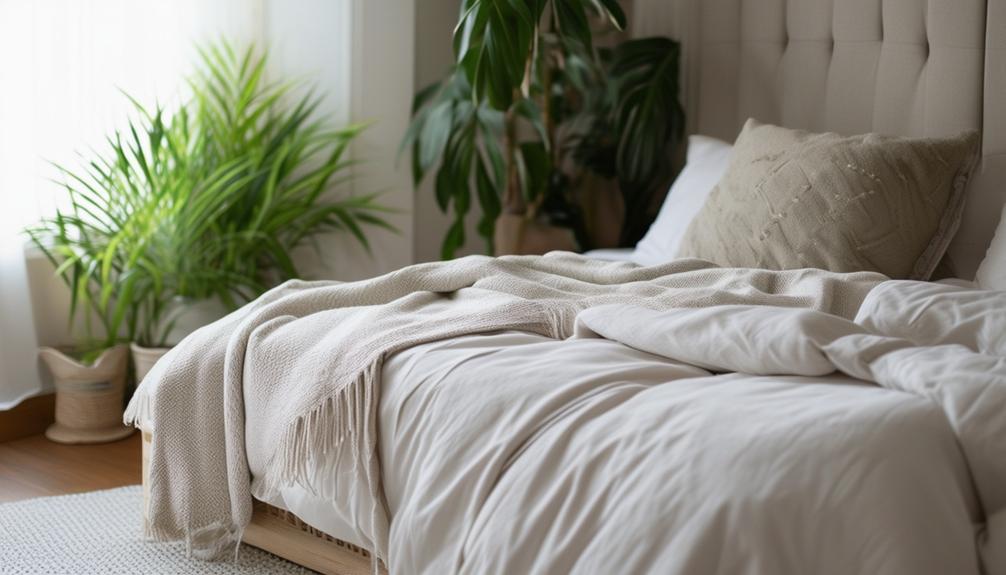
Establishing an ideal sleep environment is essential for improving the quality of your rest and addressing insomnia. Start by maintaining a cool room temperature between 65-72 degrees Fahrenheit. This helps with temperature regulation and guarantees a comfortable, relaxing sleep environment.
Keeping your bedroom dark and quiet is equally important. Blackout curtains or a sleep mask can block out light, while earplugs or a white noise machine can minimize disruptions.
Your choice of bedding also plays a vital role. Invest in comfortable bedding that suits your preferences, whether that’s a soft mattress, cozy blankets, or supportive pillows. Adding extra layers can help you adjust your comfort level as needed.
Establishing a consistent bedtime routine signals to your body that it’s time to wind down. This routine should be calming and free of stimulating activities. Also, make sure to avoid caffeine, alcohol, and heavy meals before bed, as these can interfere with your ability to fall and stay asleep.
Creating a quiet sleep environment that’s conducive to rest will greatly improve sleep quality. By optimizing your sleep environment, you’ll be well on your way to achieving more restful and restorative sleep.
Practice Mindfulness and Relaxation
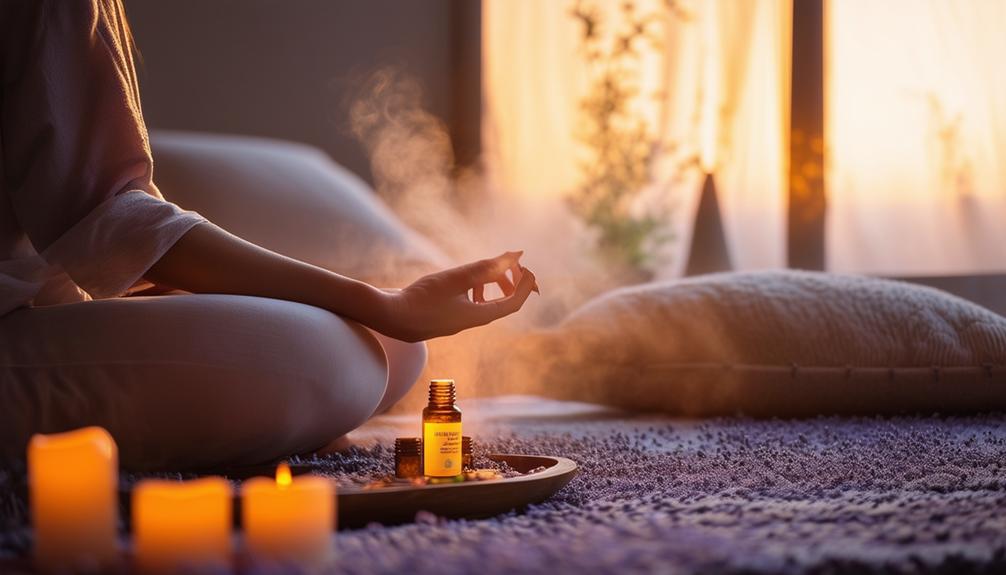
To naturally improve your sleep, try practicing mindfulness and relaxation techniques.
Meditation before bedtime and deep breathing exercises can calm your mind, reduce stress, and prepare your body for restful sleep.
These evidence-based practices are simple yet effective ways to enhance your overall sleep quality.
Meditation Before Bedtime
Practicing mindfulness meditation before bedtime can greatly reduce stress and enhance relaxation, making it easier for you to fall asleep and stay asleep. By incorporating mindfulness meditation into your bedtime routine, you can promote relaxation and improve your sleep quality. This natural remedy for insomnia focuses on calming the mind and being present in the moment.
Mindfulness meditation involves paying attention to your breathing and letting go of any racing thoughts. Studies have shown that this practice can reduce the time it takes to fall asleep and decrease wakefulness during the night. By dedicating just a few minutes each evening to this practice, you can create a peaceful shift from your busy day to a restful night.
Engaging in mindfulness meditation before bed sends a clear signal to your body that it’s time to unwind. This consistent bedtime ritual can help reduce stress and promote a sense of calm, making it easier to drift off to sleep.
Deep Breathing Techniques
Deep breathing techniques, like mindful breathing, offer a powerful way to reduce stress and enhance relaxation before bedtime. By focusing on your breath, you can calm your mind and improve sleep quality. Practicing these techniques before bed can alleviate insomnia symptoms and set you up for a restful night.
Incorporating deep breathing into your bedtime routine can lower your heart rate, reduce anxiety, and create a sense of calmness. This holistic, evidence-based approach not only prepares your body for sleep but also fosters a sense of belonging in your self-care practices. Here’s a simple table to get you started:
| Technique | Benefits | Tips for Practice |
|---|---|---|
| Mindful Breathing | Reduces stress and anxiety | Focus on inhaling deeply |
| 4-7-8 Breathing | Lowers heart rate | Inhale 4 sec, hold 7 sec, exhale 8 sec |
| Diaphragmatic Breathing | Enhances relaxation | Breathe from your diaphragm |
Incorporate Regular Exercise

Regular exercise, such as walking, swimming, or yoga, can greatly enhance your overall well-being and improve sleep quality. Engaging in physical activity helps regulate your circadian rhythm, ensuring a healthy sleep-wake cycle. When you incorporate regular exercise into your routine, you’re setting yourself up for restorative sleep and peak sleep benefits.
Low-impact exercises like walking or yoga are particularly beneficial. They’re gentle on your body while still offering significant sleep improvements. Aim for at least 150 minutes of exercise per week, and consider morning or afternoon sessions to maximize sleep quality. This routine can drastically reduce symptoms of insomnia and foster restful sleep.
Incorporating exercise not only boosts your physical health but also positively impacts your sleep patterns. As you engage in these activities, you’ll find a sense of community and belonging, knowing you’re taking steps toward holistic well-being. Your commitment to regular exercise will be a cornerstone in improving your overall health and sleep quality.
Try Herbal Supplements
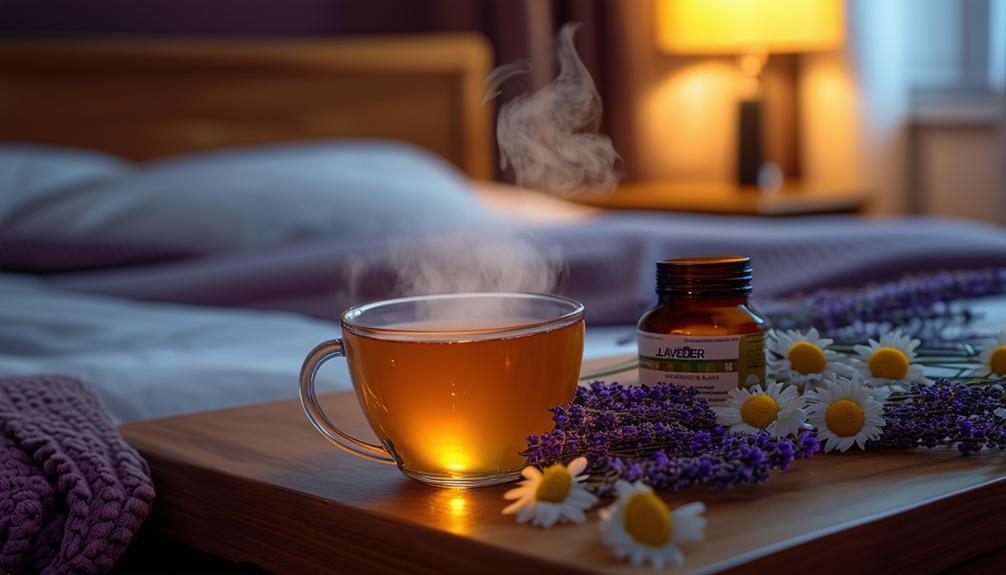
When considering herbal supplements for insomnia, you might find valerian root, chamomile, and lavender oil particularly effective. These natural remedies are backed by research and can be incorporated into your routine as teas, oils, or capsules.
Always consult a herbalist to confirm you’re using the right dosage and to be aware of any potential side effects.
Popular Herbal Choices
Many people find that popular herbal choices like valerian root, chamomile, and lavender oil can greatly enhance their sleep quality naturally. Valerian root, known for its calming effects, is available in capsules, extracts, or teas. It’s an important herbal remedy for insomnia and can help improve your sleep quality. Chamomile is another excellent option; its calming effects are well-documented, and it’s often consumed as a tea, oil, or supplement to help you relax and drift into a peaceful slumber. Lavender oil, with its soothing aroma, has been shown to improve sleep and induce a sense of calm.
| Herbal Remedy | Form | Primary Benefit |
|---|---|---|
| Valerian Root | Capsules, Extracts, Tea | Improved Sleep Quality |
| Chamomile | Tea, Oil, Supplement | Calming Effects |
| Lavender Oil | Oil, Capsules | Sense of Calm |
These herbal supplements offer a holistic approach to managing insomnia. However, it’s important to seek advice from a herbalist to understand the varying evidence quality and possible interactions with medications. Embracing these natural remedies can make you feel connected to a community that values holistic and patient-centered approaches to health.
Potential Side Effects
Given their natural origins, herbal supplements for insomnia can sometimes cause side effects such as dizziness, headaches, or gastrointestinal disturbances. Valerian root, a popular choice, might interact with medications like sedatives or antidepressants, leading to adverse effects.
Chamomile, another common remedy, could trigger allergic reactions, especially if you’re sensitive to plants in the daisy family.
It’s essential to consult your healthcare provider before trying herbal supplements, particularly if you have preexisting health conditions or are on medication. They can help you navigate potential interactions and assess if these remedies are suitable for your specific situation.
Remember, what works for one person mightn’t work for another, and individual reactions can vary.
Using herbal supplements requires caution. Be aware of any unexpected side effects and monitor how your body responds. If you experience any adverse reactions, stop using the supplement and seek medical advice promptly.
Your goal is to improve sleep in a safe and effective manner, so prioritize your health by making informed decisions. Embrace this holistic approach, knowing you’re not alone in seeking natural ways to enhance your well-being.
Use Aromatherapy
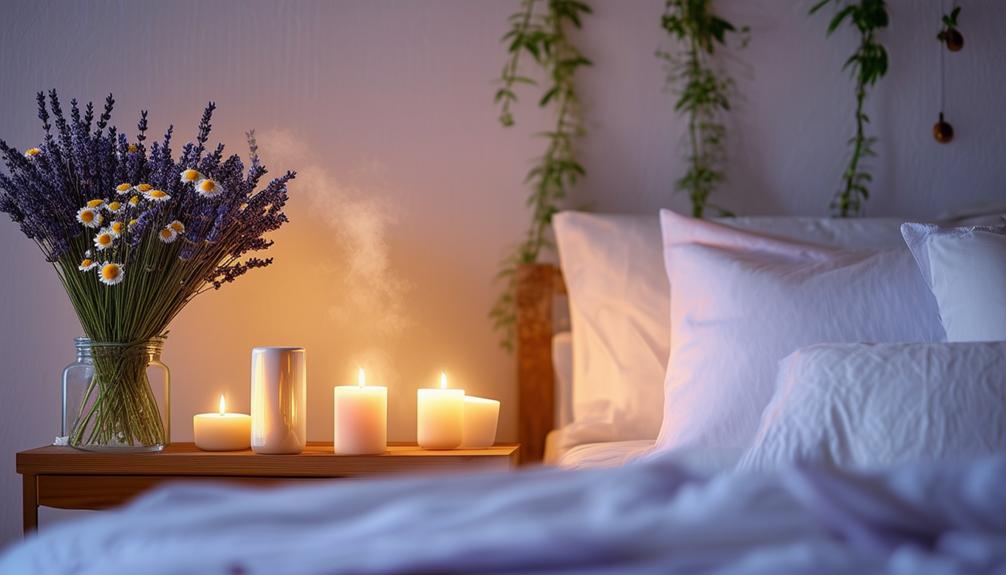
Aromatherapy, specifically with lavender essential oil, offers a natural and effective way to enhance your sleep quality and relaxation. Lavender has long been cherished among natural sleep aids for its impressive ability to improve sleep quality and reduce insomnia symptoms. Its soothing scent can calm your mind and body, preparing you for a restful night.
Incorporating lavender aromatherapy into your bedtime routine can create a calming sleep environment that promotes relaxation. You can use a diffuser to disperse the lavender essential oil throughout your room or opt for a pillow spray to enjoy its benefits directly where you rest your head.
Studies have shown that inhaling lavender oil can notably lessen insomnia symptoms, making it a gentle way to support better sleep without side effects.
Limit Stimulants and Heavy Meals

In order to enhance your sleep quality, it’s important to avoid stimulants like caffeine and nicotine close to bedtime. These substances can keep your mind alert and disrupt your natural sleep cycle, making it harder for you to fall asleep. Consuming caffeine late in the day can linger in your system, leading to sleep disturbances and restless nights.
Similarly, nicotine acts as a stimulant, which may interfere with your ability to relax and unwind before bed.
Heavy meals can also impact your sleep. Eating large portions or rich, fatty foods late in the evening can slow down digestion, causing discomfort and making it difficult to fall asleep. Instead, opt for light, easily digestible snacks if you’re hungry before bed. This practice can help prevent the discomfort that often accompanies heavy meals and reduce the likelihood of sleep disturbances.
While alcohol might seem to help you fall asleep initially, it can disrupt your sleep cycle, leading to fragmented and restless sleep. By limiting stimulants and heavy meals before bedtime, you’re taking a holistic, evidence-based approach to regulate your sleep-wake cycle and promote better sleep.
Explore Acupuncture
After making adjustments to your diet and stimulant intake, another effective strategy worth exploring is acupuncture to improve your sleep quality. This ancient practice involves inserting thin needles into specific points on your body, promoting relaxation and helping to regulate sleep patterns.
By stimulating the release of endorphins and serotonin, acupuncture can greatly reduce stress and anxiety, which are common culprits behind insomnia. Studies have shown that acupuncture isn’t only safe but also effective in decreasing insomnia symptoms and enhancing overall well-being. It’s a holistic approach tailored to your individual needs, making it a patient-centered treatment option.
Each session is designed to address your specific sleep disturbances, combining traditional Chinese medicine with modern evidence-based practices. The benefits of acupuncture extend beyond just falling asleep faster. It aims to improve sleep quality, ensuring you wake up feeling rested and rejuvenated.
For many, it becomes an essential part of a holistic insomnia treatment plan, often combined with other integrative approaches. So if you’re yearning for restful nights and a sense of belonging in a community that values well-being, acupuncture might just be the key to enhancing better sleep for you.
Consider Cognitive Behavioral Therapy

Often considered a cornerstone of non-pharmacological treatments, Cognitive Behavioral Therapy (CBT) for insomnia focuses on reshaping the thoughts and behaviors that disrupt your sleep. Unlike medications, CBT offers a sustainable way to improve sleep quality by addressing the underlying factors contributing to chronic insomnia.
CBT involves several components that work together to help you develop healthy sleep habits. Here’s what you can expect:
- Cognitive restructuring: This helps you identify and challenge unhelpful thoughts about sleep, replacing them with more positive and realistic ones.
- Sleep restriction: By limiting the time you spend in bed to only when you’re actually sleeping, you can increase sleep efficiency.
- Stimulus control: This involves creating a strong association between your bed and sleep, encouraging behaviors that promote restful sleep.
- Relaxation techniques: These methods help decrease pre-sleep anxiety and physical tension, making it easier to fall asleep.
Research shows that CBT is more effective and sustainable for improving sleep quality than medication. Tailored to individual needs, this therapy is often recommended as a first-line treatment for chronic insomnia. By focusing on both thoughts and behaviors, CBT empowers you to take control of your sleep and cultivate long-lasting healthy sleep habits.
Frequently Asked Questions
How I Naturally Cured My Insomnia?
You can naturally cure insomnia by incorporating personal experiences like mindfulness meditation and cognitive therapy, improving sleep hygiene, creating a calming evening routine, making dietary changes, managing stress, engaging in physical activity, and optimizing your sleep environment.
What Is the Strongest Herb for Sleep?
Valerian root is considered one of the strongest herbs for sleep. Still, Chamomile tea, Passion flower, Lemon balm, Hops extract, Lavender oil, Ashwagandha benefits, Skullcap tincture, Magnolia bark, and Holy basil also offer holistic sleep improvements.
What Helps You Go to Sleep Naturally?
When wanting to wind down, try herbal teas, essential oils, and meditation techniques. Improve sleep hygiene, create a calming sleep environment, and establish a bedtime routine. Support melatonin production, practice breathing exercises, reduce caffeine, and use white noise.
What Is the Most Effective Natural Sleep Aid?
To tackle insomnia, try melatonin supplements, chamomile tea, lavender oil, valerian root, or passionflower extract. Magnesium supplements, warm baths, sleep hygiene, herbal infusions, and cognitive therapy also help. Embrace these holistic, evidence-based methods for restful sleep.
Conclusion
You’ve got plenty of natural remedies at your disposal to improve your sleep. Some might say these methods don’t work, but evidence shows that a holistic approach can be incredibly effective.
By establishing a sleep routine, optimizing your environment, and incorporating mindfulness, you’re setting yourself up for success.
Don’t forget the benefits of regular exercise, herbal supplements, and even acupuncture. Remember, it’s about finding what works best for you and sticking with it.
Sweet dreams!



